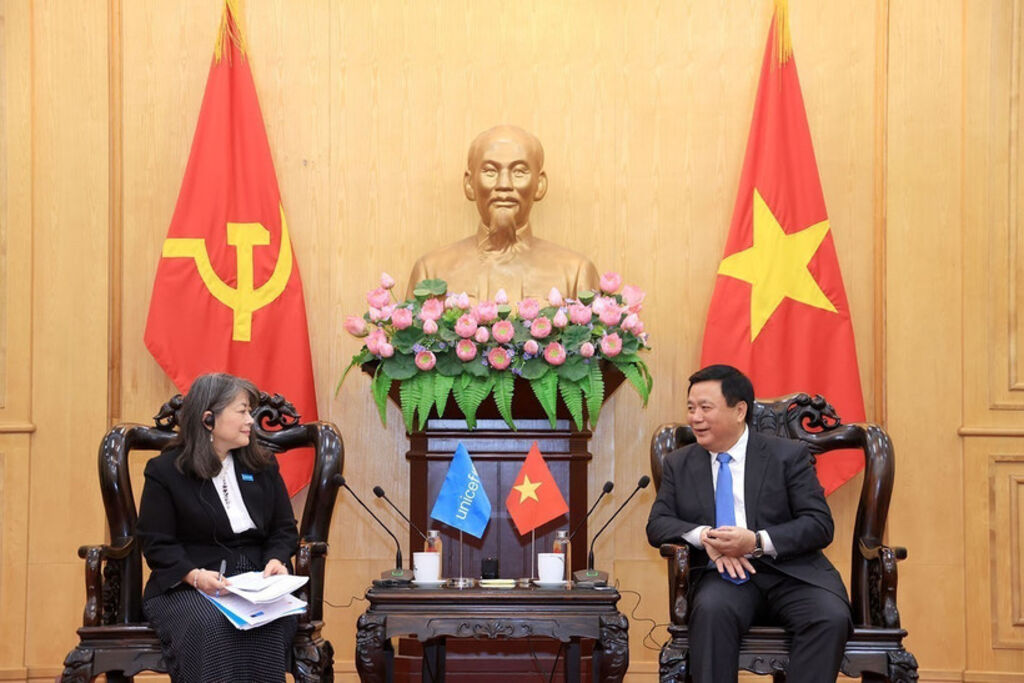 |
| HCMA President Prof. Dr. Nguyen Xuan Thang (R) receives UNICEF Regional Director for East Asia and the Pacific June Kunugi on November 25, 2025__Photo: VNA |
President of the Ho Chi Minh National Academy of Politics Prof. Dr. Nguyen Xuan Thang (R) receives UNICEF Regional Director for East Asia and the Pacific June Kunugi on November 25, 2025__Photo: VNA
UNICEF Regional Director for East Asia and the Pacific June Kunugi expressed interest in forging a comprehensive cooperation framework with the Ho Chi Minh National Academy of Politics (HCMA) during her meeting with HCMA President Prof. Dr. Nguyen Xuan Thang in Hanoi on November 25.
The UNICEF official stressed that all policies and programs must be child-centered and evidence-based, especially as vulnerable groups — including children — face growing exposure to economic shocks and climate-related disasters.
Thang, who is also Chairman of the Central Theory Council, expressed his deep impression of UNICEF’s contributions to Vietnam’s development over the past five decades, stressing that its assistance has played an important role in changing public awareness, particularly in protecting and ensuring children’s rights and improving their access to healthcare and education, and integrating child-related issues into policymaking.
Vietnam is working hard on implementing important resolutions, including those on building a modern and globally-integrated national education system, and improving people’s healthcare and wellbeing, Thang noted, adding that the country is making great efforts to waive tuition fees for all public school students, from preschool to high school levels, and ensure free meals for students in public schools.
Mentioning major challenges Vietnam is facing — including the impacts of climate change and natural disasters, and especially protecting children's rights amid the surge of digital technology and artificial intelligence, Thang proposed establishing mechanisms for policy dialogue, and developing cooperative programs and projects that take a comprehensive approach, combining policy research and advisory work with training and capacity-building on child protection.
Vietnam is speeding up the development of national databases on population and social sectors, he said, calling on UNICEF to support Vietnam in building a national database on children.
Kunugi congratulated Vietnam on its great strides and highlighted that Vietnam was the first country in Asia and the second in the world to ratify the Convention on the Rights of the Child, demonstrating an early vision of recognizing children’s rights as the foundation for human rights, development, peace, security, and stability.
She also acknowledged Vietnam’s prominent achievements, including significant reductions in child mortality and malnutrition, support for early childhood development, universal access to primary education, and improvements in the child protection system.
The UNICEF official highlighted the role played by the HCMA in shaping national policies and training leaders, expressing a desire to strengthen cooperation with the academy to build child-focused databases and evidence to inform policy decisions.
The two sides agreed on the direction of future cooperation, concentrating on policy research and consultation, personnel training, digital transformation and child-related data, as well as joint organization of international workshops and seminars.
The same day, the HCMA and UNICEF co-organized a seminar to share research and cooperation results between Vietnam and UNICEF in creating development opportunities for children.
Speaking at the seminar, Assoc. Prof. Dr. Nguyen Manh Hung, HCMA Vice President, affirmed that Vietnam always places children at the center of its national development strategy. He highlighted UNICEF as a trusted partner of Vietnam over the past 50 years.
Kunugi reaffirmed that UNICEF is committed to fully supporting the Vietnamese Government’s plans to ensure that every child is protected, educated, and given access to all opportunities for socio-economic development, leaving no child behind.
Participating scientists and experts provided recommendations for the agenda for children in 2026–2030, with a vision toward 2045.- (VNA/VLLF)









